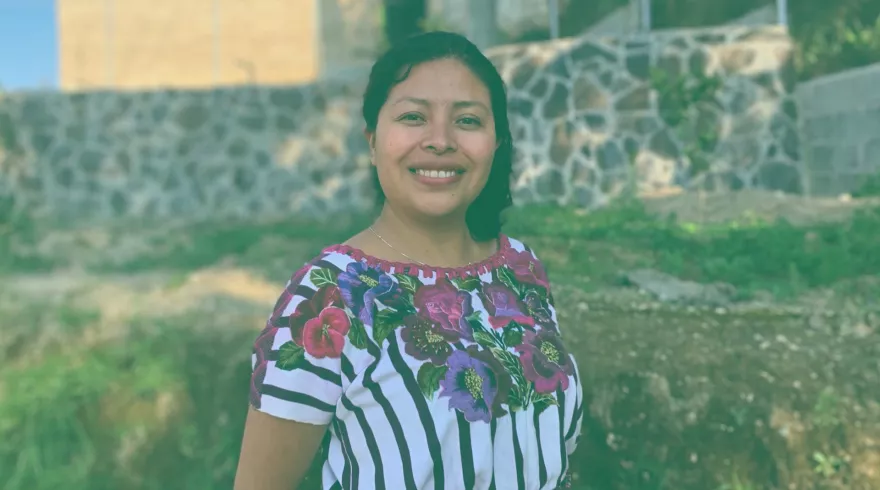
Change maker: Puts people first
Andrea Coché Mendoza, MAIA / Guatemala (Sololá)
I am Andrea Coché Mendoza. I am a Mayan Tzʼutujil from here in Guatemala. I work for the organization Asociación MAIA, which is located in the department of Sololá, Guatemala and I am a Change Maker in the category of Putting People First.
I come from a family that in some ways has been very proactive in the community. My mother was one of the few women who was able to go to school, who only made it to 6th grade, but for my grandparents it was so important to go to school to break the cycle of poverty and discrimination that they lived through and I heard many of those stories.
Somehow I wanted to honour my grandparents' dream of changing the lives of their children and grandchildren. They did everything they could to get my mother into school and by giving her this opportunity to go to school, it also made her part of the women who were working for the community. She has worked all her life in community health and since I was a teenager I was involved in many of her activities, such as nutrition campaigns, women's health campaigns, and many other things related to community health. And I spent a lot of time working with her as a volunteer, and the connection with this was more in the stories of my family, the history of poverty in my family, the history of change in my family, because the idea of wanting to study something that would support me in continuing along this path grew a lot. That's how I managed to study social work, because it was a challenge too, since I was the first, almost of all my family, to go to school over 6th grade, the middle level. When I graduated as a teacher, which was the only thing I could study because it was the only thing my dad could afford, and well it was very difficult because he did have many fears too. Fear of social pressure, that his daughter would not continue to be at home like the rest of the teenage girls who were learning to knit, to sew. Social pressure that my mother was working outside the community. So my family was quite unusual.
When I left school I wanted to study social work at the university, but my father said, "Well, I can't afford that. So that's how I continued my training and worked for the Secretariat of Agrarian Affairs, which is a government entity, at the time and I knew a lot about the political and social problems in the agricultural sector in my country. And above all because women were also very undervalued and had no presence at the negotiating tables.
So much so that I came to see that my passion to continue working on community issues grew, but I wanted to focus on the issue of women. So it was there, in the midst of all this, my search, that I found MAIA and so I am here. For me, being in MAIA is very important, it is my passion, it is part of my life. I have been collaborating with them for ten years, because many of the girls who are in the program are making a similar journey to the one that many of us made. MAIA is led by a team of women who come from situations of poverty and discrimination, but with everything we had on the way we managed to get here.
We are the majority of women who are the first to go to university, and that's why my colleague Lidia's theme sounded familiar to you. I, my partner Norma, Wilma, many of us come from similar situations as the teenagers are now. So it's like: if I can do it, you can do it! Our journey has been similar.
MAIA has very much in mind the theme of the model that, if you see it, you can do it, and if you have a model, and you have a mentor that accompanies you, then it is much stronger. I think that's where my passion comes from. We firmly believe that when we give a woman the opportunity to train, her impact is infinite. She develops potential, she develops solutions, she is part of the solution. But we have to open those doors, we have to create those systems that help sustain her. So I think that's where my story with MAIA comes in, I entered very young with them, 10 years ago. And we have built this whole organisation, now together with my colleagues, and that also makes me proud, because in my country it is a lot that indigenous women are for domestic work, the women of my country, especially indigenous women, are relegated to traditional roles that perpetuate systems of poverty. And we want to show, and we are showing that this is not the case, that life is much more than that, that there are many more opportunities and that we too can change the world.
This article is based on an interview conducted by A Good Day in Africa. Listen to the full interview below.

